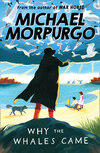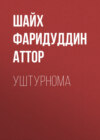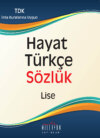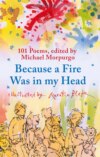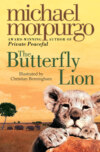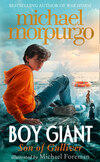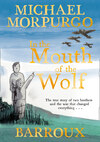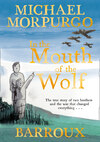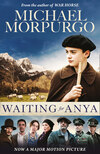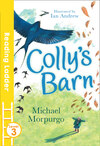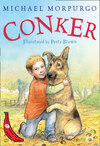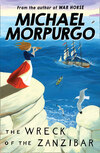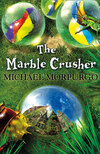Kitabı oku: «Why the Whales Came», sayfa 2
‘We don’t need to, Gracie,’ he said. ‘Look.’ And he wrote in shells beside the Birdman’s message: ‘Thanks. Daniel and Grace.’
‘No,’ I shouted as soon as I saw my name in the sand. ‘You can’t, you can’t! He’ll know who we are if you do that, he’ll come after us and put his curses on us.’ And I lifted my foot and kicked the sand all over Daniel’s writing until I had obliterated every last letter. I was crying in spite of myself. ‘Father says he puts spells on people. We mustn’t talk to him. We’re not supposed to.’
Daniel looked up at me and I could see from the look in his eyes that he was disappointed in me. ‘But we’re not going to talk to him, are we?’ he said. ‘Look, Gracie, it stands to reason. If the Birdman had wanted to put a spell on us he could have done it already, couldn’t he? Well he could, couldn’t he?’ I would not answer him because I hated to be wrong, and I knew well enough in my heart that I was. In my shame and fury I kicked the cormorant over on its side and ran off up the beach towards Samson Hill. Daniel called after me to come back and all my rage at my own humiliating fear burst from me.
‘If you’re so brave, Daniel Pender,’ I screamed at him, ‘then you can sign your silly name; but I’m not coming here again, never, d’you hear me? Never. You can keep your silly boats and your silly cormorant for all I care. I don’t want it and I don’t want ever . . .’, and I would have gone on to say every hurtful thing I could think of, had I not caught sight of the Birdman’s dog plodding purposefully along the beach behind Daniel, his tongue lolling out of his mouth. I tried to call out to Daniel to warn him but my voice would not speak as it should, so I just pointed and ran back down over the sand to warn him.
The dog paid us no attention but went straight to where the cormorant lay and sniffed it. Then, arranging his jaws with care around it, he picked it up and came and sat tidily at our feet looking very pleased with himself, his tail swishing the sand behind him.
The dog seemed to have no eyes, for they were covered by a curtain of matted black ringlets. ‘He’s giving it to you,’ I said. ‘He wants you to take it.’
‘For us is it?’ Daniel asked the dog and he took the cormorant out of its mouth. ‘Did he send you then, did the Birdman send you?’ And the dog licked his lips and shook the sand out of his mouth. Daniel patted him and parted the hair over his face to reveal two shining black eyes. ‘How can you see through all this lot?’ he said.
And then the dog pricked up his ears, stood up and looked around towards the cottage. He stopped panting for a moment and listened. Before we knew it he was bounding away over the sand and had vanished into the dunes. Neither of us had heard a whistle, but neither of us had any doubt at all that he had been called back.
‘Must have been watching us,’ I said. ‘He must have seen me kick it over, mustn’t he?’
Daniel brushed the sand off the cormorant’s head. ‘See, I told you, Gracie, didn’t I? He just wants to be friendly, that’s all.’ And he dropped to his knees in the sand. ‘Come on. We’ve got to thank him, haven’t we?’
We never spoke a word after that but knelt in the sand together and collected all the shells we were going to need. Then I wrote out in orange shells: ‘Thanks for the cormorant.’ And both of us signed our names in shells underneath.
We stayed all day sailing our boats on Rushy Bay and even when Daniel suggested the sea was getting too rough I insisted we stayed on, just to prove to myself, to him and to the Birdman that I was no longer frightened. True, I did keep my eye on Heathy Hill, but now I was almost hoping the Birdman would come down to the beach with his dog. He did not come however, and my new-found courage was not put to the test, not yet anyway. As we left the beach Daniel cupped his hands to his mouth and called out, ‘Goodbye’, in the direction of the cottage, and I waved with him because I felt sure that the Birdman would be watching us.
Back in Daniel’s boatshed that evening we stood by his workbench and examined the cormorant closely. ‘One day, Gracie,’ he said, ‘one day, I’m going to be able to make something like that.’
‘What happens if someone finds it?’ I asked. ‘What are we going to say?’
‘Just tell them I made it,’ he said laughing. ‘But they may not believe us, so better if they don’t find it. I haven’t got a room of my own to hide it and I haven’t got anywhere to put anything, not anywhere private anyway. You got a room of your own, Gracie, you keep it. It’ll be safer with you. If Father finds it, he’ll only want to know where it comes from and Big Tim will torture me till I tell him.’ And he handed the cormorant carefully to me. I already knew where I would hide it – I was only worried about how I was going to get it there without being discovered.
‘I’ve been thinking, Gracie,’ Daniel said. ‘He gave us this cormorant to show us he was friendly, didn’t he? So we’ve got to do the same, haven’t we? We’ve got to give him something back so’s he knows we want to be friends as well. I’ve been thinking. D’you think he’d like it if we made him one of our boats?’
‘Could call her Woodcock, couldn’t we?’ I said. ‘We’ve got to name it after a bird, like all the others are. Woodcock’s a kind of bird, isn’t it?’
‘Never seen one,’ said Daniel, ‘but I think it is.’
And so I went home that evening with the Birdman’s cormorant stuffed inside my blouse. Mother paid me no attention as I came in; she was busy over the stove and I reached the safety of my room without her even seeing me.
We built Woodcock together that spring, but it was nearly summer before she was ready for launching. We had never taken so much trouble over a boat as we did with Woodcock. Nothing was ever right until it was perfect. We took her to Rushy Bay for her trials and pushed her out towards Samson Island. She danced out over the waves, her sail catching the wind and leaning her over so that she sped out to sea. I think she might have gone all the way to Samson had we not waded waist high into the sea after her and brought her back. She was quite magnificent with her shiny blue hull, her white stripe and her brick-red sail. Daniel was satisfied. So we left her, beached well above the high-water mark; and we left too a long shell message for the Birdman in the sand. It read: ‘We name this boat Woodcock. May God bless her and all who sail her’; and we signed it, ‘Daniel and Grace’.
We waited until sundown in the purple humming heather on Samson Hill to see if the Birdman would come for it, but he never came. We could not stay any longer for mother always liked me to be home before dark. But first thing the next morning we went back to Rushy Bay and found the boat gone. In its place there was this message: ‘Thanks. Beautiful.’ And underneath, ‘Zachariah Woodcock.’
3 Messages in the Sand
I NEVER MUCH LIKED GOING TO SCHOOL. IT WAS A nuisance for it took me away from home and from everything I wanted to be doing. But that summer it was more than a nuisance, it was an intrusion into our secret life on Rushy Bay and I resented it more than ever. I feigned sickness successfully on a few occasions, until Mother discovered that Daniel always seemed to be ill on the same day I was and put a stop to it. Sometimes, though not very often for Mother would have suspected me, I was able to persuade Father he could not do without me on the boat and I managed to stay off school that way. I knew we would only be out lobster fishing for the morning, so Daniel and I could spend the afternoon down on Rushy Bay. Father was never that hard to persuade because he liked the company and it did help to have me handling the boat whilst he set or hauled the lobster pots, particularly when there was a heavy swell out around the Northern Rocks.
It was always a great deal easier for Daniel to stay away from school because no one much cared in his house whether he was at school or not, and his father was only too pleased to have an extra pair of hands in the boatshed. Whatever happened though we always went to school together or stayed away together. It was not a formal pact between us, there was never any need for that – it was just an understanding.
School was across the water on Tresco. About fifteen of us went across on the boat each day from Bryher and we often had to get out and push the boat when it became stuck fast on the sandbanks at low tide. All day at my desk I longed for lessons to be over so that I could get back to Rushy Bay. It was hardly surprising therefore that my teacher, Mr Angus Wellbeloved, was for ever reprimanding me for lack of attention. Mr Wellbeloved, or ‘Welly Belly’ as we called him, grew a crop of long white hairs out of his ears which he always twiddled to a point whenever he was reading to us, and his wiry eyebrows joined in the middle of his nose and hung around his eyes like a misplaced moustache. From an early age Mr Wellbeloved had condemned me as ‘unladylike’, ‘untidy’ and ‘unteachable’, mostly because I could never master my arithmetic. For Mr Wellbeloved, arithmetic was the yardstick by which he judged character. Sums or anything to do with figures had always induced in me a kind of panic. I raged then against their peculiar logic. I could never understand them and I cannot to this day.
Only Daniel made it all bearable. We sat side by side and survived school together. He did not care for school or for Mr Wellbeloved any more than I did, but he was clever enough to succeed at his sums and was therefore the apple of Mr Wellbeloved’s eye. I copied just enough of his sums to get by and in return he copied my spellings whenever he needed to. I was a genius at spelling and proud of it. So with Daniel beside me I made an adequate pupil, just satisfactory enough to avoid being kept in for detentions, and that was all that mattered.
I may not have liked Mr Wellbeloved – few of us did – but it has to be said that it was Mr Wellbeloved who warned us early that summer that there would be a war with Germany before very long. I asked Father about it and he told me it was all nonsense, and that anyway it did not much matter whether there was a war or not because no war could ever touch us on Bryher. I did notice that mother pursed her lips at this and kept silent, a sure sign that she did not share his optimism.
But even when school was finished for the day, Daniel and I were not free to go at once to Rushy Bay, for he was always needed to sweep up in his father’s boatshed; and father might well send me out to fish for wrasse for lobster bait, or there were always lobster pots to be mended. Sometimes it could be almost evening before we were able at last to set off together. Even so, every day without fail we managed to get to Rushy Bay, not so much now to sail our boats, although we did if the wind was right, but rather to see if the Birdman had left another message for us in the sand.
Some days, to our intense disappointment, there would be nothing there but a jumble of seaweed and flotsam. On most days though we would reach the top of Samson Hill and see the Birdman’s dog waiting for us on the beach below. Whenever he was there we knew we would find a shell message in the sand beside him, or the remains of one anyway. Often he would be sitting so close to the message that by the time we got there his ever-wagging tail had scattered the shells far and wide, leaving us the problem of trying to make some sense out of the few surviving but scarcely decipherable letters. And leading to and from the message we would find the Birdman’s distinctive footprints, the right foot broad and heavy, the left just half a footprint, five toes and the ball of the foot. It was always this left foot which dragged a continuous furrow through the sand from one print to the next.
Our exchange of shell messages became like a long drawn-out conversation. The messages took a long time to write out, so we kept them as short as possible. We tried to discover all we could about the Birdman, but by the end of the summer we still knew very little about him. We did manage to find out that he was exactly eighty years old, that the birds on the island came to him because he fed them, because they knew he liked them and because they knew he would never harm them. We learned he had been carving birds as long as he could remember, that his father had taught him. It kept his fingers from going stiff like the rest of him, and it made him feel like God because he could make any creature he wanted. All he needed was the wood, and there was plenty of that washed up on the beaches. That was all he would tell us about himself. He would simply ignore many of the questions we left behind for him; either that or the dog had wagged them out and ruined them before the Birdman could read them. We were fairly sure though that he was answering only those questions he wanted to answer.
He seemed quite happy however to tell us about his animals, so that we came to know a great deal more about them than we did about him. The donkey was called Friend, he told us. He had bad feet and a bad temper, mostly because he was old. Friend lived only for carrots which the Birdman grew exclusively for him in the garden. Just to look at him, the Birdman wrote, was to know that there was someone worse off than oneself. And he told us a lot about his dog, Prince, about how he had found him washed up in Hell Bay one day. ‘Been with me a long time now,’ he wrote. ‘Don’t know what I’d do without him.’
As the weeks passed, the pattern of questions and answers between us changed. It became clear he wanted to ask questions but not to answer them. At first he wanted to know everything about us, all about our families. He wanted to know how old they all were, what they looked like, where they lived and what they did. ‘Father builds boats.’ Daniel wrote one day.
‘What kind of boats?’
‘Gigs. Luggers. Anything.’
‘Building one now?’
‘Fishing lugger – 14ft.’
‘Flower crop good this year?’
‘Fair.’
‘Potatoes? Any blight?’
‘Late crop. No blight.’
And when the messages were longer the Birdman used bits of wood, even seaweed, to make his letters. But he always signed them ‘Z.W.’ in orange shells.
His appetite for news became more and more insatiable. For Daniel and me it was like having to describe the world to a blind man. He wanted to know everything people said, everything they did. It was after we had told him about Big Tim, about how much we hated him, that he first began to talk to us through his messages rather than simply to ask more questions. ‘Never hate anyone,’ he wrote. ‘Hate eats away at your soul.’ And when one evening we wrote that Mr Wellbeloved thought there would soon be a war with Germany we found his reply the next morning. It read simply: ‘I am sad today.’
There was no time to build boats any more now for Daniel was busy with his first puffin carving. He had originally meant it to be a standing shag drying its wings, but no matter how hard he tried he could not get the head quite right, so he cut off the wings in disgust and reduced it to a rather bulbous-looking puffin that seemed to me more like an owl, but I did not dare say so. As it turned out I did not need to, for he soon discarded it and began another.
It was hot that August of 1914, hotter than any summer I have known since. The sand on Rushy Bay was too hot even to stand on by midday, so we had to retreat to the shelter of the dunes. Here Daniel would sit cross-legged in the sand whittling away at his new puffin, and I would brush out Prince’s matted fur and pick the burrs out of the hair behind his ears while he lay panting beside me in the heat. When the sand had cooled in the late afternoon Prince would come with us down to the sea and cavort clumsily in the waves. He would swim out towards Samson for the sticks we threw for him and then lie beside us on the beach as we composed and wrote out our message in the sand for his master. But when we left for home at the end of the day he never once attempted to follow us. From the top of Samson Hill we would see him sitting alone on the beach still watching us, or trotting away up through the dunes back to the Birdman’s cottage.
From time to time we did catch sight of the Birdman himself, but always at a distance. We would see him emerging from his cottage door at dusk to feed the chickens or milk the goats, or we might catch a glimpse of his boat bobbing up and down as he rowed out towards Samson. In the early evening sometimes we might see him setting off with his donkey and cart, up towards Hell Bay, Prince following along behind; but the closest we ever came to actually meeting him was one day when that summer was almost over.
We had left the beach later than usual that evening and were on our way back over Samson Hill when we saw him rowing out around Droppy Nose Point and into Rushy Bay itself. Above him flew his usual escort of shrieking, wheeling gulls. Prince was sitting where we had left him on the beach below. We shouted and waved but the Birdman had his back to us and never turned round. We felt sure he must be able to hear us for we heard his whistle clearly and saw Prince bounding down the beach and into the water. He paddled out through the sea towards the boat, his small black head rising and falling with the waves. We watched as the Birdman shipped his oars, leant down over the side and bundled him up into the boat. We saw Prince shake himself and heard the Birdman laugh and begin to talk as he took up the oars again. Prince stood up like a figurehead in the bow of the boat as it moved slowly out towards Samson, the flock of gulls circling above. All the while we could hear snatches of the Birdman’s voice from across the water. He was too far away for us to hear what he was saying but we listened all the same, straining to pick up the sense of it over the sound of the surf.
‘What d’you think he goes over to Samson for?’ said Daniel. ‘Nothing there ’cept empty houses and sand.’
‘P’raps he goes fishing over there,’ I said.
‘He doesn’t fish,’ said Daniel. ‘I’ve never seen him fishing, have you? And it’s strange, Gracie, you only ever see him out in his boat in bad weather. Doesn’t seem to bother him. You noticed that? I’ve seen him out in gales before now. He’ll go out in any weather. Funny that, don’t you think?’
I looked over towards where Samson lay brooding darkly under gathering storm clouds. About it the sea, blood-red with the evening sun, surged and heaved. ‘Island of ghosts,’ I said. ‘Don’t care what you say, Daniel, I tell you there’s ghosts on Samson just like father said there was. You only got to look at it. It’s cursed, Daniel, I can tell it is.’
‘Don’t believe in ghosts,’ said Daniel dismissively, and he turned away. ‘And I don’t believe in curses either.’
‘Well I do,’ I snapped, suddenly angry at him, and we walked on down through the heather in silence.
The first few drops of rain were so huge and heavy that they hurt the top of my head. We began to run. The rain pounded us all the way home, stinging our eyes and ears. By the time we got there we were soaked through and dripping from our noses and chins. The houses all round were dark and quiet, unusually so. Only one light glowed at our kitchen window. ‘Strange,’ said Daniel, ‘there’s no lamps lit in my house. Everyone’s out by the look of it. No one about, is there? Can’t think where they could all be. Can’t see anyone in the boatshed either. Can I come in with you, Gracie, till they get back?’
I knew full well how much Daniel hated to be alone in the dark. He was brave about everything else except the dark, and that always made me feel good because the dark had never bothered me. We shook ourselves in the porch and went in together.
Mother was sitting in the kitchen, her chair rocking back and forth. The lamp was on the table beside her and her sewing lay in her lap. I expected a wigging from her for being out after dark but she looked up vacantly at us as we came in and seemed neither annoyed nor surprised that we were late.
‘Well,’ she said, a weak smile on her face. ‘You’re back.’ And then, ‘I’m afraid your Mr Wellbeloved was right after all, Gracie. I thought he might be you know. I didn’t want to believe him, no one did, your father least of all; but he’s an educated man, Mr Wellbeloved, he could see it coming.’
‘Right about what, Mother?’ I asked. ‘What’s happened?’
‘Where is everyone?’ Daniel asked. ‘Can’t find anyone at home.’
‘They’ve all gone to a meeting in the church, Daniel. Father’s gone too, Gracie. They called an island meeting as soon as they heard the news this afternoon.’
‘It’s the war, isn’t it?’ Daniel said. ‘They’ve started the war, Gracie, like old Welly Belly said they would.’ And mother nodded and lowered her head.
There was such a storm that first night of the war, a violent thunderstorm that flashed and rolled around the island as if it wanted to uproot it from the sea. The wind moaned and howled horribly through the house. White sheet lightning turned the night to day outside my window heralding each new rumbling crescendo of thunder.
I was still awake when Father came in later that night. I heard him talking on and on about the war and about how the Germans had it coming to them, about how they had bitten off more than they could chew, about how we were better sailors than they were because we were an island race with the sea bred into us. It would not take long to finish them, he said, and we were going to do our bit on Bryher. By day there would always be someone on the look-out for submarines up on Watch Hill; and by night there were to be no lights showing on the island, all curtains were to be drawn and the island blacked out completely. All the while I never heard Mother speak a word. But what kept me awake had nothing to do either with the war or the storm, for I had no idea then what a war really was. I thought the war like the storm would pass soon enough. I lay there all that night thinking only of the Birdman and Prince out in the tiny boat, and I prayed and prayed that they had not been caught out in the open sea when the storm broke.
Ücretsiz ön izlemeyi tamamladınız.
